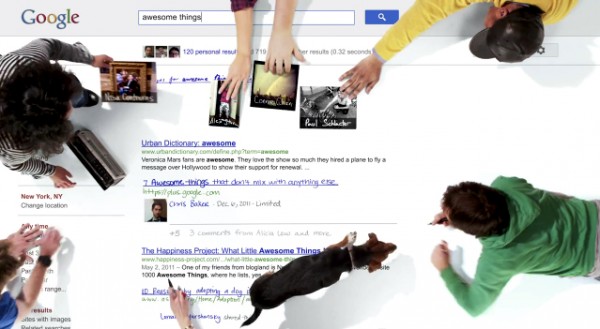We need new privacy policies for a new world
 In a major update to its privacy policy and the addition of "Search Plus Your World", Google has managed to attain the consensus from the tech-enthused world that it is way beyond the innocent baby days of "don’t be evil". Matt Honan of Gizmodo signalled the privacy shift as the end of Google’s "don’t be evil" promise, which the company built its business on, and Sarah Lacy of Pando Daily shared similar sentiments, though hers was related to the Search Plus Your World outcry.
In a major update to its privacy policy and the addition of "Search Plus Your World", Google has managed to attain the consensus from the tech-enthused world that it is way beyond the innocent baby days of "don’t be evil". Matt Honan of Gizmodo signalled the privacy shift as the end of Google’s "don’t be evil" promise, which the company built its business on, and Sarah Lacy of Pando Daily shared similar sentiments, though hers was related to the Search Plus Your World outcry.
In a nutshell, one of the biggest sore points that people are having with Google’s new privacy policy is the fact that it permits the search giant to utilize your basic profile information and extend it across your identities when using your other Google services. These changes aren't so much evil, but adaptation to our merging online and offline identities.
Change is Inevitable
Amidst all the opposition, I think it all alludes to a larger trend in technology as a whole that people aren’t readily willing to accept, yet will undoubtedly be the social media revolution that the advent of the Internet had begged from the very start. The Internet was built as a means of quickly sharing and bringing together the vast expanse of human knowledge -- the clincher is that we can’t expect to share our knowledge without sharing a portion of ourselves. Even just a little bit.
"It’s a small world" is a common saying, which points to various inventions of the past such as the telephone, aviation and motorized travel, all of which funnelled towards the fundamental idea of making human contact all the more easier. The Internet took that a step further with email. MSN Messenger took it another step further. Myspace, Facebook and Twitter took the small world concept even further, such to the point that the world can quite literally be at the doorstep. Or in a Skype video conversation, right in front of you.
Clearly the concept of privacy takes on an entirely new dimension in a world where human contact is effortlessly easy with anyone anywhere.
It’s not just Google that is changing its privacy policies to keep up with a transforming world, Facebook is doing a lot of the same thing. Facebook’s recent Timeline feature allows users to place important dates and milestones in their lives in somewhat of a virtual calendar, and to fill in the big events of one's life that may have occurred before Facebook was invented.
Even more crucial though is Facebook’s new Open Graph feature, allowing apps to share data to one’s Facebook Wall without even having to ask. If you go on a run and a smartphone app tracks all the contextual metadata, such as your calories burnt, heart rate and distance, it’s immediately on your Facebook Wall for people to see. If you’re listening to a song, it will show up on your Facebook wall. Of course, the app has to ask once, the first time, but from there on it’s all free flowing.
Unifying Identities
There’s a noticeable trajectory here, by eliminating these walls of permissions that have been the dividing lines between what happens in real world and what subsequently occurs in our online lives, Facebook is making its service all the more seamless and our online identities all the more important. If Facebook’s Open Graph goes so far as to make our Wall in perfect sync with every activity of our waking lives, it’s not ridiculous to say that online identity is on par in pertinence with our real lives.
Perhaps the term "real lives" needs some redefining at this stage.
Which brings me back to Google and its decision to rewire and unify user identities across products and services. If social media has reached such a point that online identities are comparable with real life identities, then it's high time they started acting that way.

People don’t walk the streets with a generic gender avatar for a face, a pseudonym for a name and hide behind an uncrackable block of pixels -- they shouldn’t on the Internet. Sure, pseudonyms are good for brand and identity building in platforms like YouTube, but everywhere else, in front of every online persona there should be a face and a name. Anonymity is an impossibility in real life, its use should be limited, too, in the online world.
The real crux though for many users isn’t having themselves linked to a profile, but having that profile visible to anyone who so happens to stumble across them, or know their email address. But this fear of discovery can be traced back and compared to our real lives once again with the understanding that we are constantly being discovered. People learn about us by seeing us on the train, through word of mouth between friends of friends or through direct contact by meeting and interaction.
Man on a Train
But it’s a smaller world with the Internet -- the equivalent of being discovered on the train may be a man who stumbles across our Google+ profile while on a train in another country. The equivalent of word of mouth between friends of friends could be word of instant message, and direct contact may be a Google+ hangout with someone a 12-hour flight away.
It’s a smaller world so we should expect to be found in new ways and in greater numbers.
Privacy concerns are all valid, but the privacy concerns of today are quickly becoming redundant as the world quickly shifts into tomorrow, imputed by the fast progressions of the Internet and social media. People have embraced social changes in the past with email and of course the telephone, but the online identity is a lot more difficult to grasp given it’s so abstract. It’s almost philosophical. But to be brutally frank, those who can’t seem to see the idea and value behind the public and discoverable online identity really shouldn’t be on Google+ and Facebook in the first place, where it’s habitual to give one’s information and life story away like garbage.
Google’s not evil, the company is simply growing out of old ideas and moving forward in a manner that can’t fit old molds anymore. Until we all recognize that, we’ll all be living in a world that won’t even exist anymore.
Photo Credit: LeventeGyori/Shutterstock
 Jeremy Liu is a high school student who first became obsessed with technology in the 8th grade when his father bought him an iPod touch after months of begging. At a time when iPhones and the iPod Touch were spectacularly rare, the device managed to fascinate both himself and his friends. Liu now shuns the mainstream and roots for underdogs, owning a Windows Phone, Blackberry PlayBook and Sony Walkman X. Since then technology has grown from a passion to an obsession and he now directs his energies towards writing. You can find him on Facebook, Google+ and Tumblr.
Jeremy Liu is a high school student who first became obsessed with technology in the 8th grade when his father bought him an iPod touch after months of begging. At a time when iPhones and the iPod Touch were spectacularly rare, the device managed to fascinate both himself and his friends. Liu now shuns the mainstream and roots for underdogs, owning a Windows Phone, Blackberry PlayBook and Sony Walkman X. Since then technology has grown from a passion to an obsession and he now directs his energies towards writing. You can find him on Facebook, Google+ and Tumblr.